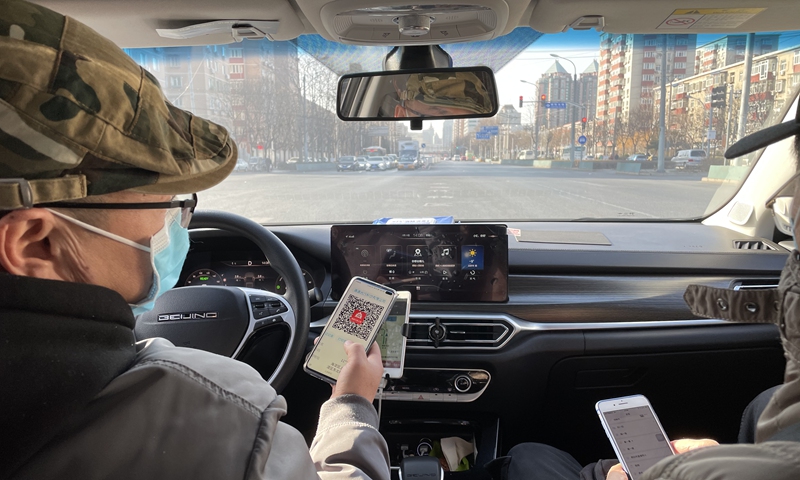
A passenger scans a health code provided by a car-hailing driver in Beijing on Monday, the first day that Beijing required car hailing services to register the health codes of passengers. Photo: Liu Caiyu/GT
China has announced new rules guiding ride-hailing platforms to set an upper limit on commissions taken from drivers, as a measure to safeguard workers' labor rights and further strengthen anti-monopoly regulation in the new service industry.
The rules, announced by the Ministry of Transport (MOT) and eight other government agencies on Tuesday, order online car-hailing platforms to announce pricing and income distribution rules, set reasonable limits on commissions, and inform the driver of the commissions after each order.
Online platforms are also being told to disclose the caps through their apps and social media.
Online car-hailing platforms are urged to scientifically determine the working hours and work load of drivers, continue to optimize the dispatch mechanism, improve operational efficiency, and avoid pushing drivers to work overtime.
Regulators also re-emphasized the need for supervision of monopolistic practices and unfair competition in the industry, as well as preventing the disorderly expansion of capital, and for severely investigating and penalizing price dumping, especially on a large scale, in accordance with the law.
The new rules came after the Ministry of Human Resources and Social Security of China in September told leading delivery and ride-hailing platforms including Meituan, Ele.me, Didi and Huolala to enhance their protection of employees' rights and interests.
Liu Dingding, a Beijing-based independent analyst, told the Global Times on Tuesday that for online ride-hailing platforms such as Didi, drivers are actually their core assets.
"The orderly and long-term development of ride-hailing will be determined by whether the rights and interests of drivers are assured," said Liu.
Liu suggested that the latest announcement is likely to push the country to enact laws targeting online ride-hailing platforms.
"Commuting is a massive industry that needs more attention and rectification, and related laws may help the industry develop in a correct path," he said.
The move also comes as China is intensifying its regulatory campaign against monopolistic practices, with major moves including inaugurating the new National Anti-monopoly Bureau and fining technology giants for old deals that violated antitrust regulations.
Global Times


